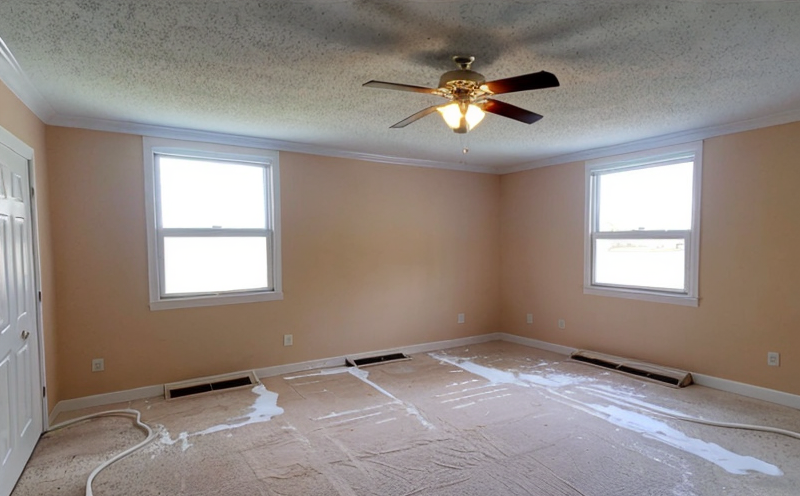ASTM E1269 Specific Heat Capacity by DSC Testing
The ASTM E1269 standard specifies a method for determining the specific heat capacity of metallic materials using differential scanning calorimetry (DSC). This testing technique is particularly useful in industries where precise thermal property data are crucial, such as aerospace, automotive, and electronics. Understanding the specific heat capacity allows engineers to optimize material selection based on energy storage capabilities or thermal management requirements.
Specific heat capacity refers to the amount of heat required to raise one gram of a substance by one degree Celsius without changing its state. In metals, this property is highly influenced by atomic structure and impurities, making it important for quality control and research and development processes. This test helps in identifying materials that can withstand high temperatures or have excellent thermal conductivity.
During the ASTM E1269 testing process, a sample of the material is heated at a constant rate while simultaneously being compared to an empty reference pan. The difference in heat flow between these two pans is measured and recorded over time. This data allows for accurate calculation of the specific heat capacity as a function of temperature.
Preparation of the specimen is critical in ensuring reliable results. Typically, specimens are prepared from standard shapes such as pellets or rods with dimensions specified by ASTM E1269. The samples must be free from contamination and have consistent properties along their length to avoid introducing variability into the test data.
The testing apparatus used for this procedure includes a high-precision differential scanning calorimeter equipped with an appropriate heating system capable of maintaining precise temperature control. Calibration against known standards ensures that all measurements are accurate and repeatable. Data processing software is utilized to analyze the collected thermal data, providing detailed reports on specific heat capacity versus temperature.
The ASTM E1269 standard defines acceptance criteria based on reproducibility and repeatability limits. Reproducibility refers to the consistency of results when different laboratories perform the test under identical conditions, while repeatability focuses on obtaining similar outcomes within a single laboratory setting over multiple trials. Ensuring these limits are met guarantees that the specific heat capacity values obtained are reliable and meaningful.
Real-world applications of ASTM E1269 testing extend across various sectors. In aerospace manufacturing, accurate knowledge of material specific heat capacities aids in selecting lightweight yet robust alloys for engine components or structural parts subjected to extreme temperatures during operation. For automotive manufacturers, this information helps optimize radiator design by choosing materials capable of dissipating excess heat efficiently without compromising on weight.
Additionally, electronic device producers rely on these tests to ensure their products meet stringent thermal management standards set forth by industry regulations like ISO 9240-1. By understanding how different metals behave thermally under varying conditions, engineers can design circuits that remain cool enough to operate safely even when exposed to high ambient temperatures.
Furthermore, research institutions utilize ASTM E1269 testing as part of their ongoing efforts to develop new alloys with improved thermal properties for specific applications. For example, developing a heat-resistant metal alloy requires extensive experimentation involving numerous iterations of sample preparation and characterization until an optimal composition is achieved.
Eurolab Advantages
EuroLab offers unparalleled expertise in conducting ASTM E1269 specific heat capacity tests using DSC technology. Our state-of-the-art facilities are equipped with the latest calorimeters calibrated against international standards, ensuring precise and accurate results every time.
- Accurate Calibration: All our instruments undergo rigorous calibration procedures to ensure they meet or exceed ISO 17025 requirements.
- Experienced Staff: Our team comprises highly qualified professionals with years of experience in materials science and testing methodologies.
- Comprehensive Reporting: Every test comes accompanied by a detailed report that includes raw data, graphs, and interpretations tailored specifically for your needs.
We pride ourselves on delivering rapid turnaround times without compromising on quality. Whether you need one-off tests or ongoing support through our consulting services, EuroLab is here to meet all your requirements efficiently and effectively.
Quality and Reliability Assurance
- Data Integrity: Our commitment to maintaining data integrity ensures that every measurement made during ASTM E1269 testing adheres strictly to the defined protocols outlined in the standard.
- Traceability: All our tests are traceable back to primary standards maintained by national metrology institutes like NIST (USA) or PTB (Germany).
The precision and accuracy of ASTM E1269 testing are paramount, especially when dealing with critical applications where even small variations could lead to significant discrepancies. By adhering strictly to the outlined procedures, we minimize any potential sources of error, thereby enhancing confidence in our findings.
Our robust quality management systems further bolster reliability by implementing regular audits and continuous improvement initiatives aimed at identifying areas for enhancement. This proactive approach ensures that our services remain up-to-date with evolving technological advancements and regulatory requirements.
Customer Impact and Satisfaction
- Enhanced Decision-Making: Accurate knowledge of specific heat capacity enables customers to make informed decisions regarding material selection, leading to improved product performance and reduced costs associated with suboptimal choices.
- Risk Mitigation: Understanding how materials respond thermally under various conditions helps mitigate risks related to overheating or failure due to thermal stress.
By providing reliable ASTM E1269 test results, EuroLab contributes significantly to customer satisfaction by offering valuable insights that can be translated into tangible benefits for their businesses. Whether it's optimizing manufacturing processes, enhancing product design, or ensuring compliance with industry standards, our services play a crucial role in achieving these goals.
We work closely with our clients throughout the testing process, from initial consultation through final report delivery, to ensure they receive comprehensive support tailored specifically to their needs. This collaborative approach fosters long-term relationships built on trust and mutual success.





